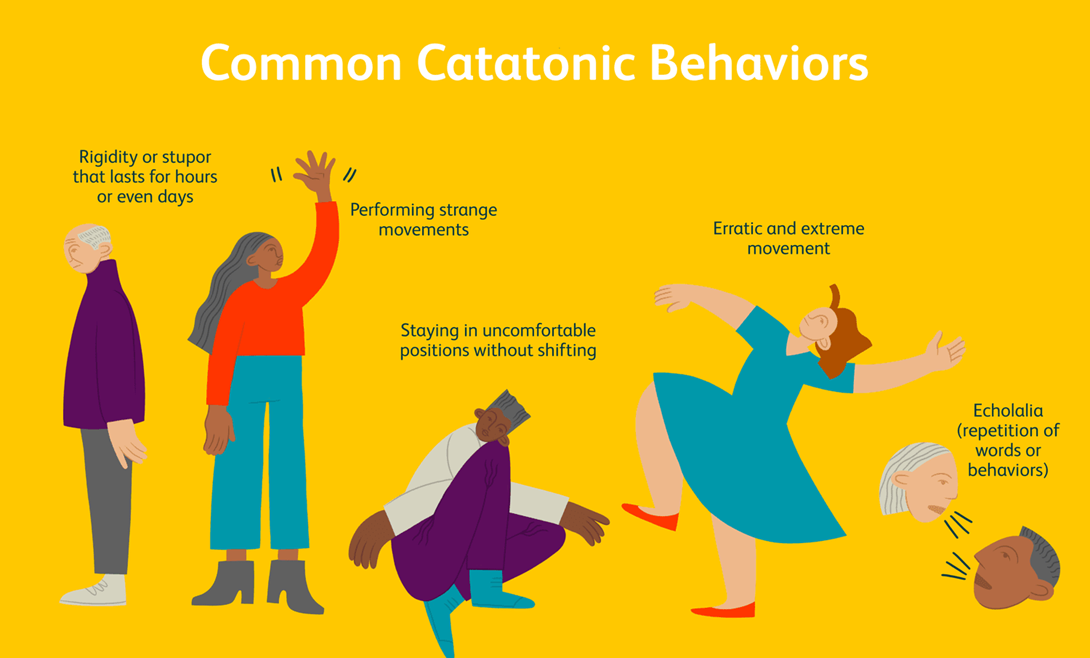Lisa is a 22-year-old woman who experiences episodes of extreme muscle rigidity. She sometimes repeats a word or phrase over and over. Attempts to move her are met with increased muscle resistance. What is she exhibiting?
Catatonia
Disorganized schizophrenia
Schizotypal disorder
Brief psychotic disorder
The Correct Answer is A
Choice A reason: Catatonia is characterized by symptoms such as extreme muscle rigidity, repetitive speech, and resistance to movement, which align with Lisa's presentation. It is often associated with other mental health conditions but can also be a standalone diagnosis.

Choice B reason: Disorganized schizophrenia is marked by disorganized thinking and behavior, inappropriate emotional responses, and erratic actions. While Lisa's symptoms could suggest a psychotic disorder, they do not specifically indicate disorganized schizophrenia.
Choice C reason: Schizotypal disorder involves eccentric behavior, odd beliefs, and difficulty forming close relationships. Lisa's symptoms do not align with the core characteristics of schizotypal disorder.
Choice D reason: Brief psychotic disorder is a short-term condition that includes delusions, hallucinations, and disorganized speech. Lisa's symptoms could be part of a brief psychotic episode, but the specific mention of muscle rigidity and resistance to movement is more indicative of catatonia.
Nursing Test Bank
Naxlex Comprehensive Predictor Exams
Related Questions
Correct Answer is C
Explanation
Choice A reason: Phobia is an anxiety disorder characterized by an excessive and irrational fear of specific objects, situations, or activities, which does not align with Ms. T's symptoms.
Choice B reason: PTSD is a disorder that can occur after a person has been through a traumatic event, which is not indicated in Ms. T's case.
Choice C reason: SSD is characterized by an extreme focus on physical symptoms, such as pain, that causes major emotional distress and problems functioning, which matches Ms. T's experience.
Choice D reason: GAD involves persistent and excessive worry about various things, not just physical symptoms, so it is less likely than SSD in this scenario.
Correct Answer is ["A","B","D"]
Explanation
Choice A reason: Deep breathing and coughing exercises help clear the lungs and prevent atelectasis, a common postoperative respiratory complication.
Choice B reason: Incentive spirometry encourages patients to take deep breaths, which can help keep the lungs clear of mucus and prevent pneumonia.
Choice C reason: Leg exercises improve circulation and can help prevent blood clots, which can lead to pulmonary embolism, another serious respiratory complication.
Choice D reason: Early ambulation, or getting the patient moving as soon as possible after surgery, is crucial for preventing respiratory complications by promoting circulation and lung expansion.
Choice E reason: Hand squeezes are not directly related to preventing respiratory complications; they are more associated with preventing circulatory complications.
Whether you are a student looking to ace your exams or a practicing nurse seeking to enhance your expertise , our nursing education contents will empower you with the confidence and competence to make a difference in the lives of patients and become a respected leader in the healthcare field.
Visit Naxlex, invest in your future and unlock endless possibilities with our unparalleled nursing education contents today
Report Wrong Answer on the Current Question
Do you disagree with the answer? If yes, what is your expected answer? Explain.
Kindly be descriptive with the issue you are facing.
